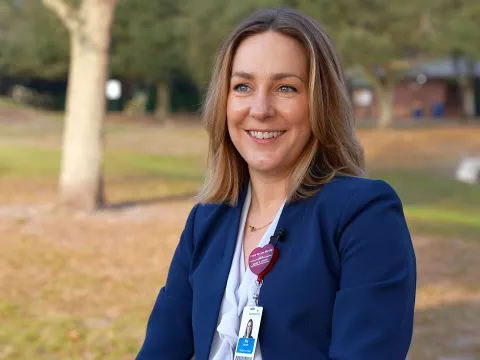- AdventHealth

In one of the most unique holiday seasons in modern history, families will face difficult but significant decisions about how they celebrate the upcoming holidays. This year’s heart wrenching question may be “Can grandma join us?”
As families struggle to balance keeping their senior loved ones safe from COVID-19 while also involving them in the holidays, experts at AdventHealth advise that the answer may lie somewhere in the middle: don’t leave them out, but instead rethink how to safely involve them this year.
Robert Rodgers, MD, chief medical officer for AdventHealth Senior Care, leads the organization’s development of a senior-focused care model for those enrolled in Medicare programs across the country. Kelley Singer, MD, director of quality for physician services for AdventHealth Hendersonville in North Carolina, has been a driving force behind the hospital’s designation as one of the nation’s top Age-Friendly hospitals by the Institute for Healthcare Improvement.
“As much effort as you’ve put into physically protecting yourself and your older adult loved ones from the virus, also make the effort to help nurture their emotional and mental health,” said Dr. Rodgers. “For our physical health, we encourage exercise, a good diet, proper rest, etc. For our mental and emotional health, it’s imperative that we stay connected with our loved ones, especially older adults who can silently struggle with isolation and loneliness, often made worse during this pandemic. Whatever safety precautions you have in place, try to keep your senior family and friends engaged and involved however you can - even if it’s in a new way.”
Dr. Singer, who has been practicing internal medicine for nearly three decades, is noticing a concerning trend among her older adult patients. “I’m noticing a trend of tears,” said Dr. Singer. “When I ask my older patients how they’re feeling, there is more emotion in their answers than usual. I’m hearing a lot that is increasingly related to fear, anxiety and depression due to the challenges of the pandemic. Many are feeling disconnected from their friends and family.”
Sometimes, Dr. Singer advises, simply asking a senior loved one what they think about this year’s holiday plans can prove insightful. “The most important thing is to ask what matters to them,” she says. “Ask them what is most important to them and think about how to create that in a safe way. You may be surprised by their answer.”
Staying Safe if Gathering in Person
Holiday gatherings are normally a special time for older adults to meet the newest additions to the family, take family photos that become keepsakes and catch up on the past year’s highlights.
For families who decide to gather during the holiday season, Dr. Rodgers advises taking evidence-based precautions. “Whatever you decide to do, at the bare minimum, be sure to use face masks properly, encourage physical distancing and frequently wash or sanitize hands. One way to show love for your family this year is by doing all you can to keep them and yourself safe,” he said. “Host holiday gatherings outside if possible. Make use of the outdoor spaces at home or in your community and set up a table for dinner outside if you can.”
In addition to reducing the risk of transmitting the coronavirus, these precautions can also help prevent the spread of flu and other illnesses that are best avoided, especially amid a pandemic where the slightest symptoms can cause alarm.
“You don’t want to cause a family panic a few days after a holiday because someone develops symptoms and potentially exposed the family matriarch. Nobody wants that burden or stress, especially during the holidays,” said Dr. Singer. “If someone does have coronavirus symptoms within 14 days after a gathering, it is important to let the group know so they can be tested and take the necessary measures.”
Staying Connected if Celebrating Apart
Over the holidays, be sure to intentionally reach out more frequently to senior friends and family. “Call, text, video call, even snail mail, and let them know you are thinking about them,” said Dr. Rodgers. He recommends to try chatting about positive topics when possible and to take time to invest in these relationships.
If an elderly loved one lives somewhere difficult to visit, Dr. Singer highlights the importance of being creative and thinking of what could bring them joy. She recommends planning ahead to arrange any assisted video calls and mail care packages with photos and special items that remind them they are loved.
“Promoting peace and joy in your family has a way of feeding the soul and can positively impact physical and mental health,” Dr. Singer said. “Our older adults need this more than ever, and this year is an opportunity to get creative and find new ways to keep the holiday spirit alive.”
However families decide to celebrate the holidays with their older loved ones this year, both experts advise prioritizing safety while focusing on what really matters this season: love, joy and peace.
For detailed guidance from the CDC on holiday celebrations and small gatherings, click here.
Recent News
AdventHealth’s corporate campus solar energy project is one of the largest privately owned solar projects in Florida.
A woman seeking help for a hand tremor never imagined that a routine visit would turn into a life-saving moment.
The AdventHealth Orchestra traveled to Washington, D.C., to perform at the Kennedy Center as part of the Capital Orchestra Festival.
For Kay Barnett, leadership goes beyond a job title -- it’s about presence, perseverance and empowering others along the way.
Dr. Sinclair has over 25 years of clinical experience as a practicing physician, including 20 years in progressive leadership roles.
ShorePoint Health Port Charlotte in Port Charlotte, Florida, has joined AdventHealth, one of the largest faith-based health systems in the United States.
This is the first initiative to place AEDs on buses in Orlando and one of the first times the technology has been implemented on public transit in the U.S.
Days before competing in the DAYTONA 500, driver Erik Jones visited a Central Florida elementary school to deliver a big surprise.
Students across seven elementary schools in Kansas received more than 1,500 pairs of new shoes and 3,000 pairs of new socks.
More patients have been helped by an innovative device for stroke survivors at AdventHealth than any other health system in the country.
AdventHealth Centra Care Medical Director Tim Hendrix, MD, explains the symptoms of and the prevention strategies for the "quad-demic" of illnesses going around.
AdventHealth has named Khelsea Bauer president/CEO for AdventHealth DeLand, effective Feb. 23.












